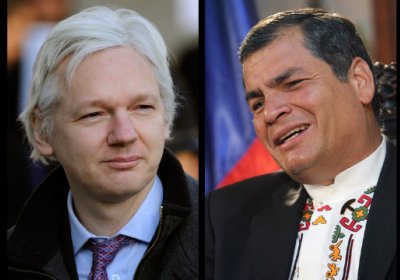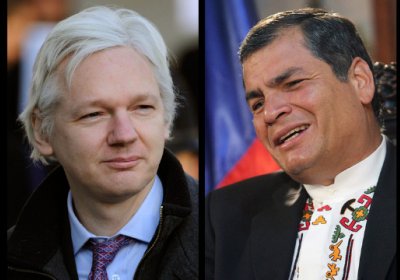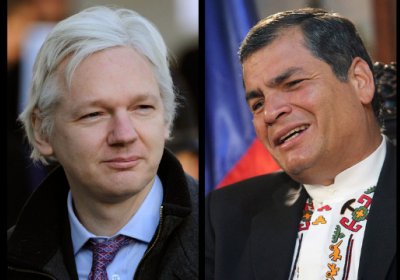The letter published below was circulated by the United States-based Just Foreign Policy. It was signed by more than 100 prominent people, mostly from the US. Signatories include film directors Michal Moore and Oliver Stone, authors Noam Chomsky and Naomi Wolf, journalists Glenn Greenwald and Chris Hedges, and Vietnam War-era whistleblower Daniel Elsberg. See here for the full list.
Ecuador
WikiLeaks editor-in-chief Julian Assange went to the Ecuadorian embassy in London on June 19 to apply for asylum, after losing his final appeal in British courts against extradition to Sweden.
The extradition to Sweden is nominally over allegations of sexual assault, for which Swedish authorities wish to question Assange ― who has not been charged. But WikiLeaks supporters point to evidence released by the whistleblowing site this year that the United States government has prepared a secret sealed indictment against him.
When WikiLeaks founder Julian Assange sought asylum on June 19, the question many supporters asked was: “Why the Ecuadorian embassy?”
The simple answer is because the Ecuadorian government has been one of the strongest supporters of WikiLeaks, which reflects its strong stance in defence of media and information freedom.
Much has been made in the media about supposed abuses of media freedom in Ecuador.
WikiLeaks editor Julian Assange is right to seek political asylum in Ecuador. He was left with no other choice after the Australian government made clear it would do nothing to prevent his extradition to the United States on espionage charges.
His real “crime” is groundbreaking journalism, which has exposed the lies and crimes of governments around the world, especially the US.
You can sign an online petition to the government of Ecuadorian president Rafael Correa in support of Julian Assange's extradition request.
* * *
To:
Rafael Vicente Correa Delgado
President of the Republic of Ecuador
Ricardo Armando Patiño Aroca
Minister of Foreign Relations, Republic of Ecuador
CC:
Raúl Gangotena
Ambassador of the Republic of Ecuador in Australia
Luis Felipe Valencia
Consul General of the Republic of Ecuador in Australia
Global Friends of WikiLeaks is an independent collective of WikiLeaks supporters. It is not affiliated with WikiLeaks. The letter below was originally posted here on June 20. You can sign an online petition to the government of Ecuadorian president Rafael Correa in support of Julian Assange's extradition request.
* * *
Criticism of Latin America’s radical governments has become common currency among much of the international left. While none have been exempt, Ecuador’s government of President Rafael Correa has been a key target.
But a problem with much of the criticism directed against Correa is that it lacks any solid foundation and misdirects fire away from the real enemy.
Correa was elected president in 2006 after more than a decade of mostly indigenous-led rebellions against neoliberalism.
Member countries of Latin America’s alternative integration bloc, the Bolivarian Alliance for the Peoples of Our America (ALBA), met for its 11th summit in Caracas on February 4 and 5 to discuss advancing the organisation.
ALBA is made up of the governments of Venezuela, Cuba, Bolivia, Ecuador, Nicaragua, Dominica, Saint Vincent and the Grenadines, and Antigua and Barbuda. Formed in 2004, ALBA seeks to develop trade on the basis of solidarity and cooperation.
Seven years after being launched by the Venezuelan and Cuban governments, the Bolivarian Alliance for the Peoples of Our Americas (ALBA) has become an important voice on the global stage willing to stand up and denounce capitalism.
ALBA has grown to include eight Latin American and Caribbean countries (Venezuela, Cuba, Bolivia, Ecuador, Nicaragua, Antigua and Barbuda, Dominica, Saint Vincent and the Grenadines.
An Ecuadorian court handed down a landmark verdict in an 18-year case against international oil-giant Chevron on February 14.
The company was fined US$8.6 billion for polluting the Amazonian basin, and $900 million in costs.
The case — perhaps the biggest environmental case in history — was filed on behalf of around 30,000 peasants, farmers, and indigenous Ecuadorians who have suffered the ill-effects of Chevron’s toxic legacy.
It is not difficult to see that the events in Ecuador on September 30 amounted to an attempted right-wing coup d’etat.
Mass mobilisations in the streets of the capital, Quito, and other cities — together with action by sections of the armed forces loyal to the government — stopped the coup before the day was out.
But those few hours highlighted, again, the deep dangers facing those fighting for progressive change in Latin America and the Caribbean.
- Previous page
- Page 13
- Next page







